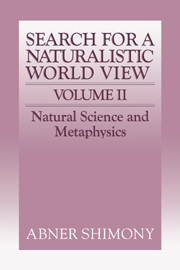Book contents
- Frontmatter
- Contents
- A MEASUREMENT IN QUANTUM MECHANICS
- B QUANTUM ENTANGLEMENT AND NONLOCALITY
- C COMPLEX SYSTEMS
- 14 The methodology of synthesis: parts and wholes in low-energy physics
- 15 Some proposals concerning parts and wholes
- 16 The non-existence of a principle of natural selection
- D TIME
- E THE MENTAL AND THE PHYSICAL
- Index
14 - The methodology of synthesis: parts and wholes in low-energy physics
Published online by Cambridge University Press: 05 June 2012
- Frontmatter
- Contents
- A MEASUREMENT IN QUANTUM MECHANICS
- B QUANTUM ENTANGLEMENT AND NONLOCALITY
- C COMPLEX SYSTEMS
- 14 The methodology of synthesis: parts and wholes in low-energy physics
- 15 Some proposals concerning parts and wholes
- 16 The non-existence of a principle of natural selection
- D TIME
- E THE MENTAL AND THE PHYSICAL
- Index
Summary
ASPECTS OF THE PROBLEM
One of the most pervasive features of the natural world is the existence of reasonably stable systems composed of well-defined parts which are to a large extent unchanged by entering into composition or leaving it. The problem of parts and wholes is to understand with the greatest possible generality the relation between the components and the composite system.
The parts–wholes problem has an ontological aspect, which concerns the properties of the components and the composite system without explicit consideration of how knowledge of them is obtained. Among the ontological questions are the following: Is there an ultimate set of entities which cannot be subdivided and which are therefore “atomic” in the etymological sense? If the properties of the components are fully specified, together with the laws governing their interactions, are the properties of the composite system then fully determined? In particular, are those properties of composite systems which are radically different from those of the components, and which might properly be characterized as “emergent,” also definable in terms of the latter? Do composite systems belong, always or for the most part, to “natural kinds”? Is the existence of natural kinds explicable in terms of the laws governing the components? Are both the possible taxonomy and the actual taxonomy of natural kinds thus explicable? Is there a hierarchy of “levels of description” – i.e., microscopic, macroscopic, and possibly intermediate – such that laws can be formulated concerning a coarser level without explicit reference to the properties at a finer level of description?
- Type
- Chapter
- Information
- The Search for a Naturalistic World View , pp. 191 - 217Publisher: Cambridge University PressPrint publication year: 1993
- 1
- Cited by



